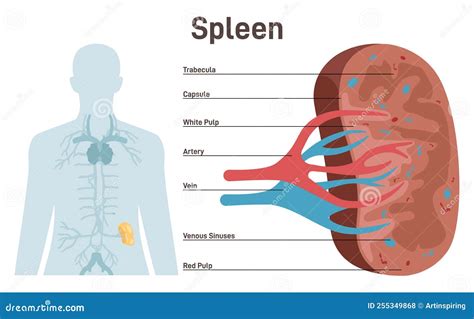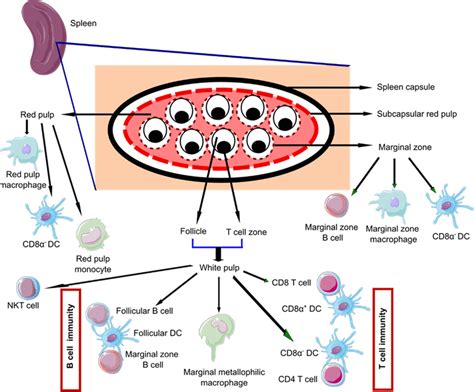Intro
Discover the vital spleen function and purpose, including its role in filtering blood, storing red blood cells, and supporting immune system health, lymphatic system, and overall well-being.
The human body is a complex and fascinating system, comprising various organs that work together to maintain overall health and well-being. One such organ is the spleen, which plays a vital role in the immune system and has several important functions. Despite its significance, many people are unaware of the spleen's purpose and how it contributes to their overall health. In this article, we will delve into the world of the spleen, exploring its functions, importance, and relevance to human health.
The spleen is an organ located in the upper left region of the abdomen, beneath the diaphragm. It is a soft, purple-colored organ that is approximately the size of a fist. The spleen is connected to the bloodstream and is responsible for filtering the blood, removing old, damaged red blood cells, and recycling the components. This process helps to maintain healthy blood cells and prevent infections. In addition to its role in blood filtration, the spleen also stores red blood cells and platelets, which are essential for blood clotting.
The spleen's function is closely linked to the immune system, and it plays a crucial role in protecting the body against infections and diseases. The spleen contains immune cells called macrophages and dendritic cells, which help to detect and eliminate pathogens, such as bacteria and viruses. The spleen also produces antibodies, which are proteins that recognize and bind to specific pathogens, marking them for destruction. This process helps to prevent the spread of infections and promotes overall health and well-being.
Spleen Function and Purpose

The spleen's function and purpose can be summarized into several key areas. Firstly, it acts as a filter for the blood, removing old, damaged red blood cells and recycling the components. This process helps to maintain healthy blood cells and prevent infections. Secondly, the spleen stores red blood cells and platelets, which are essential for blood clotting. Finally, the spleen plays a crucial role in the immune system, producing antibodies and containing immune cells that help to detect and eliminate pathogens.
Importance of the Spleen
The spleen is a vital organ that plays a crucial role in maintaining overall health and well-being. Without a spleen, the body would be more susceptible to infections and diseases, and the risk of death from infection would increase significantly. The spleen's importance cannot be overstated, and it is essential to take steps to protect and maintain its health.Spleen Disorders and Diseases

The spleen is susceptible to various disorders and diseases, which can affect its function and overall health. Some common spleen disorders and diseases include splenomegaly, spleen rupture, and spleen cancer. Splenomegaly is a condition where the spleen becomes enlarged, which can be caused by a variety of factors, including infections, liver disease, and blood disorders. Spleen rupture is a serious condition where the spleen bursts, releasing blood into the abdominal cavity. Spleen cancer is a rare type of cancer that affects the spleen, and it can be treated with surgery, chemotherapy, and radiation therapy.
Symptoms of Spleen Disorders
The symptoms of spleen disorders and diseases can vary depending on the underlying condition. Some common symptoms include abdominal pain, fatigue, weakness, and shortness of breath. In severe cases, spleen disorders can cause more serious symptoms, such as severe abdominal pain, vomiting, and bloody stools. If you are experiencing any of these symptoms, it is essential to seek medical attention immediately.Treatment and Management of Spleen Disorders

The treatment and management of spleen disorders depend on the underlying condition and its severity. In some cases, treatment may involve surgery to remove the spleen or repair a ruptured spleen. In other cases, treatment may involve medication to manage symptoms and prevent complications. It is essential to work with a healthcare provider to develop a treatment plan that is tailored to your specific needs and condition.
Lifestyle Changes for Spleen Health
In addition to medical treatment, there are several lifestyle changes that can help to promote spleen health and prevent disorders. These include eating a healthy diet, exercising regularly, and managing stress. A healthy diet should include plenty of fruits, vegetables, and whole grains, as well as lean protein sources and healthy fats. Regular exercise can help to improve circulation and reduce inflammation, while stress management techniques, such as meditation and yoga, can help to reduce stress and promote overall well-being.Spleen Health and Immune System

The spleen plays a crucial role in the immune system, and its health is closely linked to overall immune function. The spleen contains immune cells, such as macrophages and dendritic cells, which help to detect and eliminate pathogens. The spleen also produces antibodies, which are proteins that recognize and bind to specific pathogens, marking them for destruction. By promoting spleen health, you can help to boost your immune system and reduce the risk of infections and diseases.
Boosting Spleen Function
There are several ways to boost spleen function and promote overall health. These include eating a healthy diet, exercising regularly, and managing stress. A healthy diet should include plenty of fruits, vegetables, and whole grains, as well as lean protein sources and healthy fats. Regular exercise can help to improve circulation and reduce inflammation, while stress management techniques, such as meditation and yoga, can help to reduce stress and promote overall well-being.Spleen and Blood Health

The spleen plays a crucial role in blood health, filtering the blood and removing old, damaged red blood cells. The spleen also stores red blood cells and platelets, which are essential for blood clotting. By promoting spleen health, you can help to maintain healthy blood cells and prevent infections.
Importance of Blood Filtration
Blood filtration is an essential process that helps to maintain healthy blood cells and prevent infections. The spleen acts as a filter for the blood, removing old, damaged red blood cells and recycling the components. This process helps to prevent the spread of infections and promotes overall health and well-being.Spleen and Immune System Disorders

The spleen is susceptible to various immune system disorders, which can affect its function and overall health. Some common immune system disorders that affect the spleen include autoimmune disorders, such as lupus and rheumatoid arthritis. These disorders can cause the immune system to attack the spleen, leading to inflammation and damage.
Treatment of Immune System Disorders
The treatment of immune system disorders that affect the spleen depends on the underlying condition and its severity. In some cases, treatment may involve medication to manage symptoms and prevent complications. In other cases, treatment may involve surgery to remove the spleen or repair a ruptured spleen. It is essential to work with a healthcare provider to develop a treatment plan that is tailored to your specific needs and condition.Spleen and Overall Health

The spleen plays a crucial role in overall health, and its function is closely linked to the immune system and blood health. By promoting spleen health, you can help to boost your immune system, maintain healthy blood cells, and reduce the risk of infections and diseases. It is essential to take steps to protect and maintain spleen health, such as eating a healthy diet, exercising regularly, and managing stress.
Importance of Spleen Health
Spleen health is essential for overall health and well-being. The spleen plays a crucial role in the immune system, filtering the blood and removing old, damaged red blood cells. By promoting spleen health, you can help to maintain healthy blood cells, boost your immune system, and reduce the risk of infections and diseases.What is the function of the spleen?
+The spleen acts as a filter for the blood, removing old, damaged red blood cells and recycling the components. It also stores red blood cells and platelets, which are essential for blood clotting.
What are the symptoms of spleen disorders?
+The symptoms of spleen disorders can vary depending on the underlying condition. Some common symptoms include abdominal pain, fatigue, weakness, and shortness of breath.
How can I promote spleen health?
+You can promote spleen health by eating a healthy diet, exercising regularly, and managing stress. A healthy diet should include plenty of fruits, vegetables, and whole grains, as well as lean protein sources and healthy fats.
In final thoughts, the spleen is a vital organ that plays a crucial role in overall health and well-being. Its function is closely linked to the immune system and blood health, and it is essential to take steps to protect and maintain its health. By promoting spleen health, you can help to boost your immune system, maintain healthy blood cells, and reduce the risk of infections and diseases. We hope this article has provided you with a comprehensive understanding of the spleen and its importance. If you have any questions or comments, please feel free to share them with us. Remember to take care of your spleen and overall health by making healthy lifestyle choices and seeking medical attention if you experience any symptoms of spleen disorders.
